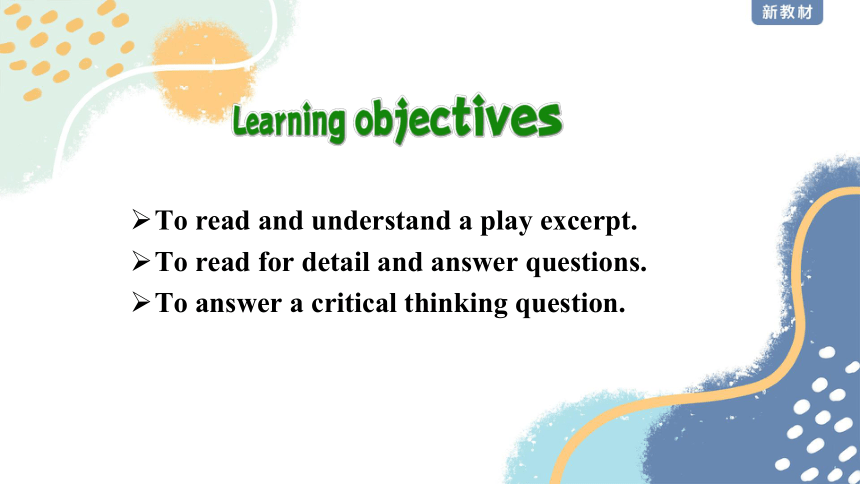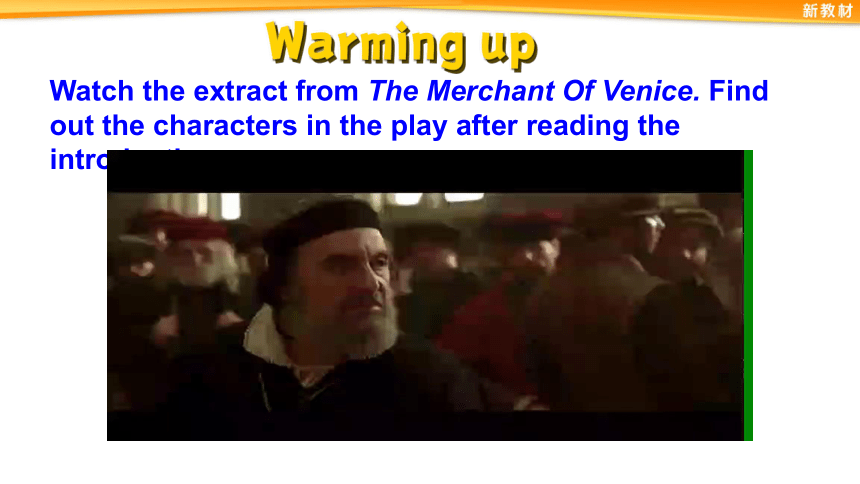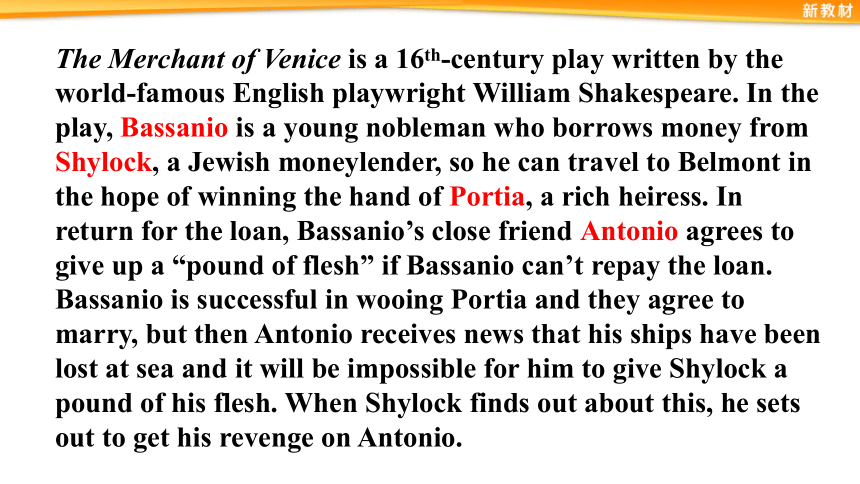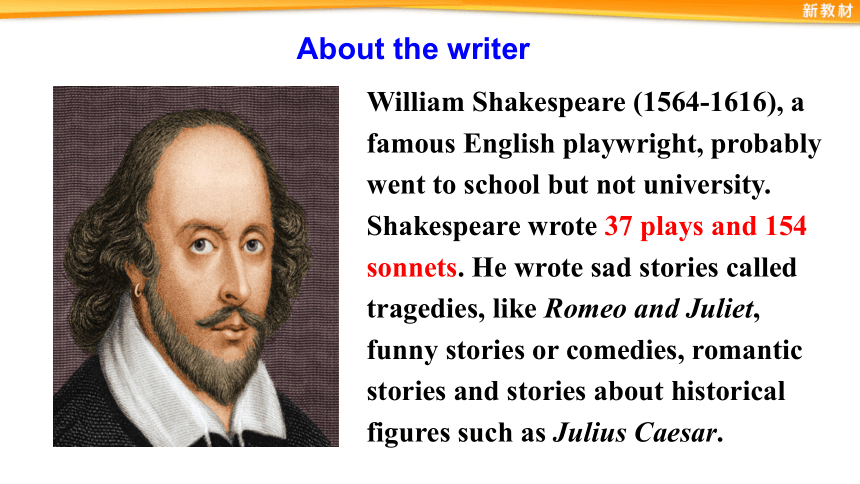北师大版(2019)选择性必修第四册 Unit10 Connections Reading Club2 精品课件(共18张PPT)
文档属性
| 名称 | 北师大版(2019)选择性必修第四册 Unit10 Connections Reading Club2 精品课件(共18张PPT) |

|
|
| 格式 | pptx | ||
| 文件大小 | 15.7MB | ||
| 资源类型 | 教案 | ||
| 版本资源 | 北师大版(2019) | ||
| 科目 | 英语 | ||
| 更新时间 | 2023-03-17 22:04:51 | ||
图片预览







文档简介
(共18张PPT)
Unit 10
UNIT 10 CONNECTIONS
To read and understand a play excerpt.
To read for detail and answer questions.
To answer a critical thinking question.
Watch the extract from The Merchant Of Venice. Find out the characters in the play after reading the introduction.
The Merchant of Venice is a 16th-century play written by the world-famous English playwright William Shakespeare. In the play, Bassanio is a young nobleman who borrows money from Shylock, a Jewish moneylender, so he can travel to Belmont in the hope of winning the hand of Portia, a rich heiress. In return for the loan, Bassanio’s close friend Antonio agrees to give up a “pound of flesh” if Bassanio can’t repay the loan. Bassanio is successful in wooing Portia and they agree to marry, but then Antonio receives news that his ships have been lost at sea and it will be impossible for him to give Shylock a pound of his flesh. When Shylock finds out about this, he sets out to get his revenge on Antonio.
William Shakespeare (1564-1616), a famous English playwright, probably went to school but not university.
Shakespeare wrote 37 plays and 154 sonnets. He wrote sad stories called tragedies, like Romeo and Juliet, funny stories or comedies, romantic stories and stories about historical figures such as Julius Caesar.
About the writer
Read the text. What does each character want What do they finally get
Character What he/she wants He/She finally gets
Bassanio To win the hand of Portia His loved woman
Shylock To get his revenge on Antonio Nothing
Portia To save Antonio Success
Antonio To help his friend What he wants
the Duke To pass sentence What he wants
Suggested answer:
In group of 5, act out the drama.
Read the expressions from The Merchant of Venice that are still used today. What do they mean
1. Everyone wants their “pound of flesh” from me.
To get the full amount of what somebody owes you by causing them to suffer and although you don’t really need it.
2. “All that glitters is not gold.”
3. All the world is “a stage where every man must play a part”.
Sometimes we judge people or situations favourably by what they look like and then we find out that things were not as they appeared to be.
There are many occasions in everyday life when one needs to pretend and in some way be an actor.
Why is Shakespeare’s work still popular today Which work do you like best Share your answers with the class.
One possible answer:
His works looked at common human themes, such as betrayal, murder, lust, power, ambition and love. These themes are as much a part of human nature today as they were all those years ago and are the themes we see in modern soap operas and Hollywood films.
1. holding up her hand to interrupt
interrupt v. to say or do sth. that makes sb. stop what they are saying or doing
打断(某人的)讲话,中断(某人的)行动,打扰
e.g. Sorry to interrupt, but I need to talk to you.
She tried to explain what had happened but he kept interrupting her.
The match took nearly three hours and was interrupted at times by rain.
【拓展】
interruption n. sth. that temporarily stops an activity or a situation; a time when an activity is stopped
中断; 中止; 阻碍
e.g. I worked all morning without interruption.
I found it hard to work with all the noise and constant interruptions.
2. Fall to your knees, therefore, and ask the Duke for forgiveness.
fall/sink/drop to your knees: to move so that you are kneeling 跪下
e.g. Tim fell to his knees and started to pray.
【拓展】knee 短语
1) at one’s mother’s / father’s) knee: at an early age 儿时
e.g. I learned to speak French at my mother’s knee.
2) on bended knee(s): kneeling, especially in entreaty or worship
(尤指乞求或崇拜时)跪着
e.g. Did your guy propose on bended knee
3) on one’s knee: on the top part of your legs when you are sitting down 在某人膝上
e.g. Daddy, can I sit on your knee
4) on one’s knees: in a kneeling position 跪着
(figurative)on the verge of collapse (喻)濒临崩溃
e.g. When they took over, the newspaper was on its knees.
Complete Activity 12 on Page 82.
Unit 10
UNIT 10 CONNECTIONS
To read and understand a play excerpt.
To read for detail and answer questions.
To answer a critical thinking question.
Watch the extract from The Merchant Of Venice. Find out the characters in the play after reading the introduction.
The Merchant of Venice is a 16th-century play written by the world-famous English playwright William Shakespeare. In the play, Bassanio is a young nobleman who borrows money from Shylock, a Jewish moneylender, so he can travel to Belmont in the hope of winning the hand of Portia, a rich heiress. In return for the loan, Bassanio’s close friend Antonio agrees to give up a “pound of flesh” if Bassanio can’t repay the loan. Bassanio is successful in wooing Portia and they agree to marry, but then Antonio receives news that his ships have been lost at sea and it will be impossible for him to give Shylock a pound of his flesh. When Shylock finds out about this, he sets out to get his revenge on Antonio.
William Shakespeare (1564-1616), a famous English playwright, probably went to school but not university.
Shakespeare wrote 37 plays and 154 sonnets. He wrote sad stories called tragedies, like Romeo and Juliet, funny stories or comedies, romantic stories and stories about historical figures such as Julius Caesar.
About the writer
Read the text. What does each character want What do they finally get
Character What he/she wants He/She finally gets
Bassanio To win the hand of Portia His loved woman
Shylock To get his revenge on Antonio Nothing
Portia To save Antonio Success
Antonio To help his friend What he wants
the Duke To pass sentence What he wants
Suggested answer:
In group of 5, act out the drama.
Read the expressions from The Merchant of Venice that are still used today. What do they mean
1. Everyone wants their “pound of flesh” from me.
To get the full amount of what somebody owes you by causing them to suffer and although you don’t really need it.
2. “All that glitters is not gold.”
3. All the world is “a stage where every man must play a part”.
Sometimes we judge people or situations favourably by what they look like and then we find out that things were not as they appeared to be.
There are many occasions in everyday life when one needs to pretend and in some way be an actor.
Why is Shakespeare’s work still popular today Which work do you like best Share your answers with the class.
One possible answer:
His works looked at common human themes, such as betrayal, murder, lust, power, ambition and love. These themes are as much a part of human nature today as they were all those years ago and are the themes we see in modern soap operas and Hollywood films.
1. holding up her hand to interrupt
interrupt v. to say or do sth. that makes sb. stop what they are saying or doing
打断(某人的)讲话,中断(某人的)行动,打扰
e.g. Sorry to interrupt, but I need to talk to you.
She tried to explain what had happened but he kept interrupting her.
The match took nearly three hours and was interrupted at times by rain.
【拓展】
interruption n. sth. that temporarily stops an activity or a situation; a time when an activity is stopped
中断; 中止; 阻碍
e.g. I worked all morning without interruption.
I found it hard to work with all the noise and constant interruptions.
2. Fall to your knees, therefore, and ask the Duke for forgiveness.
fall/sink/drop to your knees: to move so that you are kneeling 跪下
e.g. Tim fell to his knees and started to pray.
【拓展】knee 短语
1) at one’s mother’s / father’s) knee: at an early age 儿时
e.g. I learned to speak French at my mother’s knee.
2) on bended knee(s): kneeling, especially in entreaty or worship
(尤指乞求或崇拜时)跪着
e.g. Did your guy propose on bended knee
3) on one’s knee: on the top part of your legs when you are sitting down 在某人膝上
e.g. Daddy, can I sit on your knee
4) on one’s knees: in a kneeling position 跪着
(figurative)on the verge of collapse (喻)濒临崩溃
e.g. When they took over, the newspaper was on its knees.
Complete Activity 12 on Page 82.
同课章节目录
- Unit 10 Connections
- Lesson 1 How Closely Connected Are We?
- Lesson 2 Community Spirit
- Lesson 3 Anne of Green Gables
- Unit 11 Conflict And Compromise
- Lesson 1 Living In a Community
- Lesson 2 Dealing with Conflict
- Lesson 3 War Memories
- Unit 12 Innovation
- Lesson 1 Scientific Breakthroughs
- Lesson 2 Aha Moment
- Lesson 3 Stephen Hawking
